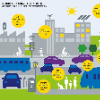In the given technology-driven era, smart cities are the next frontier of technology, aiming at improving the quality of people's lives. Many research works focus on future smart cities with a holistic approach towards smart city development. In this paper, we introduce such future smart cities that leverage blockchain technology in areas like data security, energy and waste management, governance, transport, supply chain, including emergency events, and environmental monitoring. Blockchain, being a decentralized immutable ledger, has the potential to promote the development of smart cities by guaranteeing transparency, data security, interoperability, and privacy. Particularly, using blockchain in emergency events will provide interoperability between many parties involved in the response, will increase timeliness of services, and establish transparency. In that case, if a current fee-based or first-come-first-serve-based processing is used, emergency events may get delayed in being processed due to competition, and thus, threatening people's lives. Thus, there is a need for transaction prioritization based on the priority of information and quick creation of blocks (variable interval block creation mechanism). Also, since the leaders ensure transaction prioritization while generating blocks, leader rotation and proper election procedure become important for the transaction prioritization process to take place honestly and efficiently. In our consensus protocol, we deploy a machine learning (ML) algorithm to achieve efficient leader election and design a novel dynamic block creation algorithm. Also, to ensure honest assessment from the followers on the blocks generated by the leaders, a peer-prediction-based verification mechanism is proposed. Both security analysis and simulation experiments are carried out to demonstrate the robustness and accuracy of our proposed scheme.
翻译:在特定的技术驱动时代,智能城市是技术的下一个前沿,目的是提高人民生活质量。许多研究工作的重点是未来智能城市,对智能城市采取整体方法,实现智能城市的发展。在本文件中,我们引入了未来智能城市,在数据安全、能源和废物管理、治理、运输、供应链(包括紧急事件)和环境监测等领域利用连锁技术。障碍链是一个权力分散的不可改变的分类账,它有可能通过保证透明度、数据安全、互操作性和隐私来推动智能城市的发展。特别是,在紧急情况中使用链路将提供许多参与应对的当事方之间的互操作性,提高服务的及时性,并确立透明度。在这种情况下,如果使用基于收费或先到晚的处理方法,在诸如数据安全、能源与废物管理、治理、运输、运输、运输、运输、运输、运输等领域利用链链链路段技术,则可能因竞争而延误处理工作,从而威胁人们的生活。因此,需要根据拟议的信息优先事项和快速创建区块(可变间区块创建机制)来确定交易的轻重缓急。此外,由于领导人确保交易的优先排序,同时产生障碍,提高服务的准确性,提高服务的及时性,服务性,建立选举的轮值和适当的选举程序对选举的升级和升级程序变得重要。在设计中进行中,我们的安全排序上进行。





